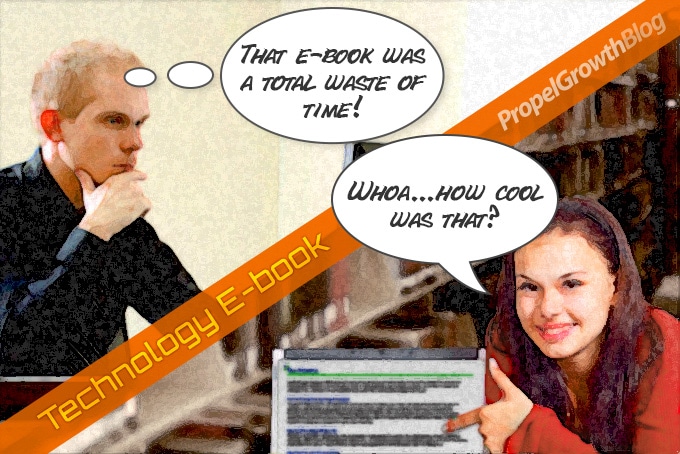![]()

Recently, I’ve been working with a few clients who are struggling to make their content marketing programs deliver revenue. These firms are generating a tremendous content, but it’s not working.
While the content generates traffic and gets a lot of conversions, the vast majority of the “leads” are not qualified. Instead, they’re students, entry level people, and sometimes people from companies or industries that are completely unrelated to the firm’s target audience. Occasionally, a lead gets accepted by Sales, but almost NONE are converting to qualified sales opportunities.
I started auditing their content and noticed that much of it is presented at a very elementary level. I pointed this out to a head of marketing, and he said, “yes, that’s our early stage awareness content. It needs to be high level.”
That would be true, if he wanted to attract leads who know almost nothing about the type of technology his firm offers. But their target personas are senior executives in wealth management and online trading. Not junior people just getting started in their careers. They have at least some knowledge about many of the topics covered by the content marketing program.
In the Early Days, It Worked
In the early days of content marketing, firms were seeing success from programs just by publishing content. Quality and depth wasn’t important. Volume was what moved the site up in search ranking and attracted more leads. Lead quality wasn’t something many firms were looking at either. Everyone focused on volume.
Back then, firms didn’t have to produce amazing (or deep) content to move the needle. They could hire inexpensive writing talent and put out high level content. And it was working. For a time. Firms saw early success because they were the only (or one of very few) firms publishing content in their specific space. Then more and more firms jumped on the content marketing bandwagon.
In the past 18-24 months, content shock has overwhelmed nearly every industry. Now, those firms that got an early head start are facing stiff competition as more content is being published by competitors, news publications, independent bloggers, etc. The noise keeps getting louder; the volume keeps growing bigger. It’s very easy to be drowned out. In February, I wrote about how content marketing has entered the “trough of disillusionment” where many firms are struggling to deliver the results they got 2 years ago.
So if you want to be successful in content marketing today, you have to change your game.
Early Stage DOES NOT Mean Entry Level.
Let’s go back to the head of marketing I mentioned earlier. This firm is using freelancers to write much of its content. The material is directed by the marketing team with very little involvement from the technical, sales, or customer support teams. The writers have no access to internal subject matter experts or to customers. Consequently, the materials they’re creating lack depth of expertise. They resort to online search to get the background they need for the content, and since they’re inexperienced in the subject matter and have no access to customers, they aren’t able to determine the level of depth necessary for the target audience.
So they guess.
And generally, they guess wrong. What seems educational for them is just scratching the surface of the topics. As a result, the content seems like it’s written for an audience that is just getting started in the applicable field.
But their buyers are not entry level. They’re senior level experts on the business and technology sides. Most of their buyers have 15-20 years of experience in their fields. They don’t need elementary content, they need something that EDUCATES them.
Generalist Copywriters are Not Subject Matter Experts
Part of the problem here is that the firm is using generalist copywriters. Neil Patel explains the issue well in this blog: “Content writers lack experience with the topic. Therefore, they can’t create in-depth and informative articles.” He goes on to say, “To write great content, [the writers] have to know your stuff forward, backward, inside out, and upside down.”
This is particularly true when writing for a financial services audience. But it’s also true for most B2B technology and other B2B companies.
I frequently receive resumes from writing candidates with generalist backgrounds who try to convince me that they can write for our financial technology clients. They’re absolutely convinced that they can do the research and learn enough about the industry to provide quality materials. Sure…if they’re willing to spend the next 5-10 years embedded in the industry. At least 99% of the writers who contact me are unqualified to write for our clients’ target audiences, because they don’t have the depth of knowledge necessary.
The only writers I’ve had success with are those who have been involved in the industry for years. Even then, one writer can’t take on all subjects we cover. For example, I don’t assign wealth management topics to my writer who’s got deep knowledge in electronic trading. And I don’t assign topics related to blockchain to my investment commentary writer.
By the way, these specialized writers are expensive. Don’t assume you can get someone for $30-40/hour. These writers command high 5- and low 6-figure incomes, because they’re worth it.
Experienced Writers Still Need Access to the Subject Matter Experts
So let’s say you hire a writer with the right level of experience in your field. Problem solved, right?
Wrong.
Even if your writer knows a great deal about your industry and target market, they still don’t have in-depth knowledge about your firm, your clients, or your specific approaches to solving client problems. They need access to your subject matter experts (SMEs) and exposure to all that buyer persona research you’re continually doing. Because you are researching your buyer personas…right? You are regularly talking to customers and prospects…right?
You should plan an interview for the writer with an SME for every piece of content to make sure it’s at the appropriate depth. And that SME should review the content before it’s published too.
Writers Also Need Strategic Guidance
Don’t expect your writer to be your content strategist or to weave together the marketing story. That’s the marketing strategist’s job. You should have someone focused on developing a strategy for every piece of content. That person should participate in the SME interviews and make sure that the plan for the content is made clear to everyone. (I often play this role for our clients.)
Content Needs a Strategic Plan
What should you include in that strategic plan? Here are a few items:
Target audience: Who are you writing for, and why would they be interested? What level of knowledge do they already have about the topic, and what do they need to know?
Target buying stage: What buying stage is this content targeting? What questions are buyers asking at that stage and what do they need to learn to take them to the next stage?
Distribution method: How will the audience find this content? Do you need related emails, social updates, promo copy, ad copy? It’s much easier to write this when the content is fresh in the writer’s mind instead of having someone else write it later.
Next step: What do you want the reader to do next, after he/she reads this piece? Do you have the next piece of content in the flow ready? Is there anything the reader can binge on if they’re really interested and have time now? Are you providing a landing page where they can easily find that content? How are you going to lead them to the next step if they don’t take immediate action?
SEO: What’s the meta description and keywords this copy should use? If the writer knows in advance, he or she can optimize for keywords while writing.
Related Assets: List all of the related assets including emails, landing pages, ad copy and artwork, next step materials, follow up emails, phone scripts for sales to follow up with leads.
Measurement: How are you going to evaluate the success of this campaign? What are the benchmarks for opens, clicks, conversions, MQLs, SALs and SQLs? How many sales qualified leads are you expecting?
Sales Follow-Through: What does Sales need to follow up on this lead? Ideally, you should provide them with:
- a brief abstract of the content
- 2-3 key takeaways
- the key points and CTA from the landing page that convinced the person to register
- 2-3 probing questions Sales could ask to get someone engaged in a conversation REGARDLESS of whether that person actually read the content they registered for.
So what do you do?
Ask Your SMEs
If you are having trouble with lead conversion rates, take a look at your early stage content from this critical lens. Ask yourself, is this written so our marketing team can understand it, or so our target audience can learn something? If you and your team lack sufficient depth in the subject matter, then get your content reviewed by key SMEs in your company. Give them clear information about the target audience, the objective of the piece and the distribution method, and what you’re expecting for response rates and Sales follow-through (see the strategic plan section above). Ask them – is this the kind of content that will actually teach our target audience something new? Is it too high level to be meaningful? Will it move them to look for more information?
Ask Your Customers
Every company has key customers who are interested in helping the firm succeed. Find out who they are, and reach out to them with a simple request. Ask someone who represents your target buyer persona to review ONE piece of content (don’t overwhelm them). Give them clear (but BRIEF) information about the target audience, the objective of the piece and the distribution method (see the strategic plan section above). Ask them – will this content educate our audience, or is it telling them what they already know? Is it too high level or elementary to be useful? Will it cause someone who has a need for your services to look for more information? Encourage them to be brutal with their feedback. You need straight answers.
Evolve Your Content Strategy
Take the feedback you get from these reviews, and start evolving your content strategy. Talk to the SMEs in your company about how you can involve them more in the process without taking too much of their time (usually, these people are the busiest in any company).
Call Us For Help
This is where I’m strongest. If you want help reviewing your content and evaluating your content marketing’s performance, give me a call, and we can discuss.
- 4 Steps to Optimize Your LinkedIn Profile for Sales Prospecting – February 12, 2021
- The Reality of Cold Calling for B2B Sales – January 11, 2021
- Can Inbound Marketing Generate Enough Leads? – January 9, 2021







